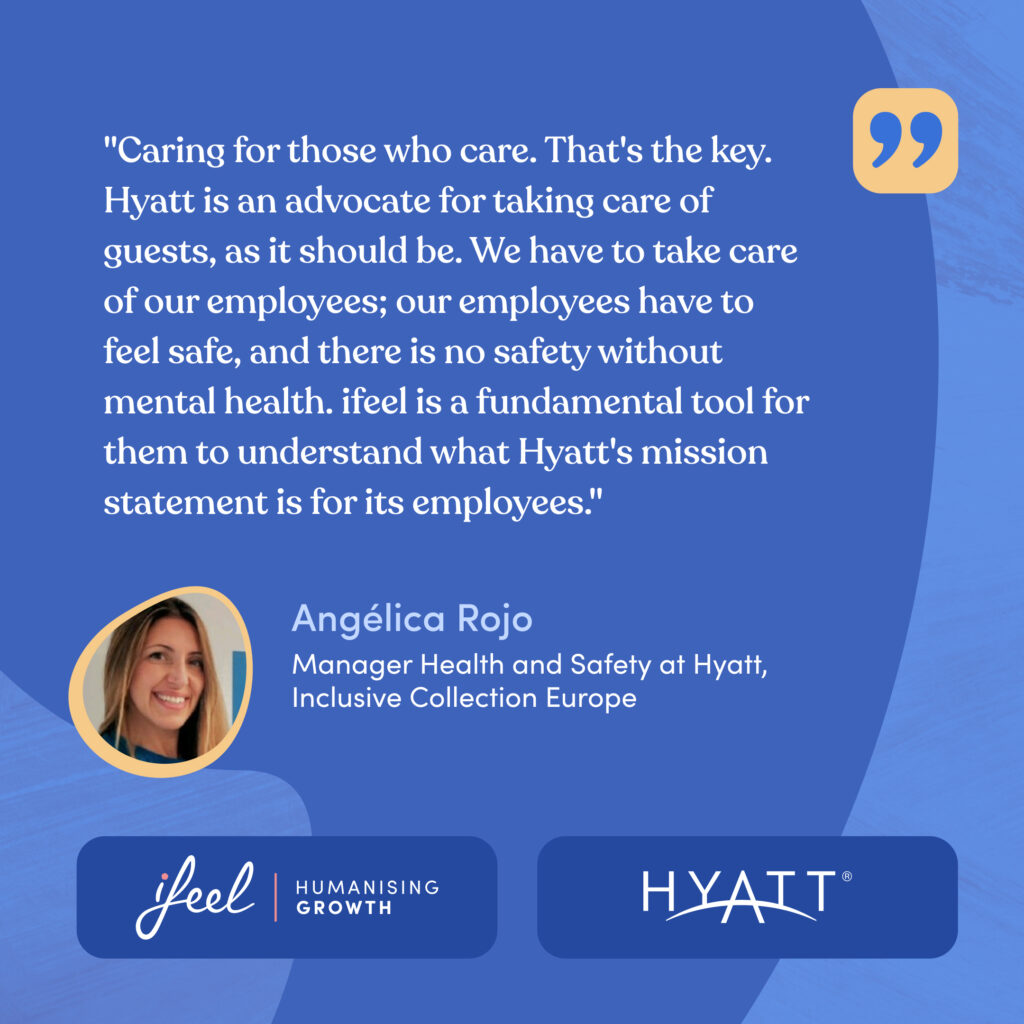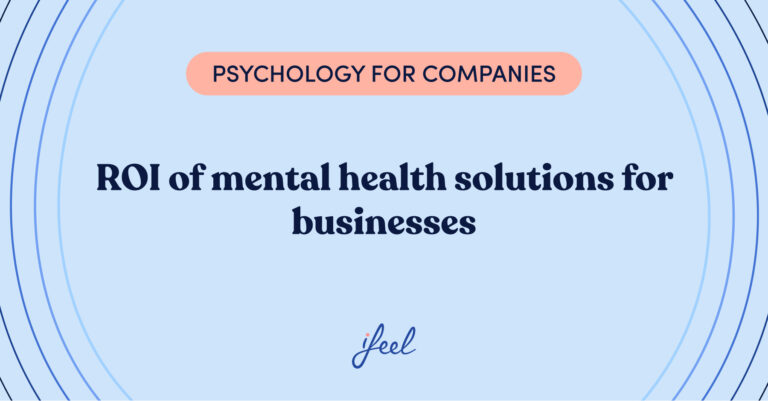Employee mental health is one of the strategic pillars for achieving business success. In this context, dates such as ‘Yellow Day’, known as ‘the happiest day of the year’, encourage us to reflect on the factors that directly influence people’s well-being and, consequently, their level of productivity at work.
Although this symbolic date has no scientific basis, it serves as a reminder that the environment and working conditions have a real impact on team performance. For companies, the real challenge lies in learning how to leverage and adapt working conditions correctly to develop sustainable strategies that promote well-being and favour business results. Identifying and promoting these factors is not just a matter of empathy, but a strategic decision that drives business results.
This is where solutions such as ifeel become a key ally. Through innovative and personalised tools, ifeel helps companies to take care of their teams effectively, reducing costs related to absenteeism, staff turnover and loss of productivity.
Mental health: Beyond Yellow Day
The concept of ‘Yellow Day’ emerged as the opposite of Blue Monday, which is socially considered ‘the saddest day of the year’. In this case, while Blue Monday, celebrated in January, is associated with factors such as the cold, Christmas debts and lack of motivation, Yellow Day, celebrated every 20 June, celebrates optimism and happiness, attributed to good weather, longer hours of daylight and the proximity of the holidays.
It is clear that although both concepts lack a solid scientific basis (since it is impossible to say, in general terms, which is the happiest or saddest day of the year), these popular celebrations invite us to reflect on the impact of our environment on our mood and our levels of well-being.
However, although Yellow Day is an excuse to talk about happiness, the mental health of employees should not be taken lightly in the workplace. Mental health problems have negative consequences that directly impact financial results, not only as a matter of ethics but also at a business level.
In fact, according to the World Health Organisation (WHO), mental disorders such as anxiety and depression cost the global economy more than £1 trillion a year due to lost productivity.
In this context, companies are responsible for creating work environments that promote well-being on an ongoing basis. This not only improves the quality of life of employees, but also generates tangible benefits for the organisation, such as reduced costs associated with sick leave and improved commitment and talent retention.
Factors that influence mental health at work
| Factor | Description | Benefit for employees and the company |
|---|---|---|
| Work flexibility | Implement intensive workdays or remote work policies to allow for a better work-life balance. | Reduced stress and increased job satisfaction. |
| Greater contact with nature | Encourage outdoor activities or create green spaces in the workplace. | Improved emotional well-being and reduced stress. |
| Socialisation and team cohesion | Organise activities that promote interaction between colleagues, such as corporate events or after-work gatherings. | Strengthening social ties and improving the working environment. |
| Constant emotional support | Provide accessible resources, such as mental health programmes, to manage employee stress and anxiety. | Ensures mental health and improves team productivity and commitment. |
How ifeel transforms mental health into business results
At ifeel, we understand that mental health is not just a benefit for employees, but a strategic investment for businesses. Our mental health solution combines advanced technology and clinical expertise to deliver a comprehensive approach that benefits both individuals and organisations. To do this, it carries out:
1. Early risk identification
Through data-driven assessment tools, ifeel identifies employees at risk of emotional problems before they affect their work performance. This not only improves employees’ quality of life, but also helps companies avoid costs associated with absenteeism and turnover.
‘Thanks to ifeel’s support and follow-up, we have been able to offer an emotional well-being service to our employees, always ensuring confidentiality throughout the process.’
— Virginia Grenón Lobato, Global Head of Human Resources Operations at Cabify, an ifeel partner company.
2. Personalised plans for each employee
Every person is different, and at ifeel we know that. That’s why we offer action plans tailored to each employee’s risk level, which can include everything from psychoeducational content to individual therapy.
| Risk Level | Proposed Solution | Benefit for the Company |
|---|---|---|
| Low | Educational content and workshops | Prevention of future problems |
| Medium | Chat or video therapy | Stress reduction and improved productivity |
| High | Intensive individual therapy | Prevention of sick leave and turnover |
3. Measurable financial impact
Implementing a solution like ifeel not only improves employee well-being, but also generates a positive financial impact. According to our data, companies can save between €15,000 and €50,000 for each high-risk case managed effectively.
4. Positive organisational culture
In addition to individual benefits, ifeel helps companies build an organisational culture that prioritises emotional well-being. This not only improves the company’s reputation as an employer, but also attracts and retains the best talent.
Strategies for implementing a sustainable approach to mental health
Mental health in the workplace should not be considered a one-off initiative or a reactive response to specific problems. Instead, it should be integrated as an essential component of organisational culture, aligned with the company’s strategic objectives. Below are some key recommendations for developing a sustainable approach that benefits both employees and the organisation:
1. Incorporate mental health solutions
Having a solution such as ifeel allows companies to offer their employees access to mental health resources in a confidential, personalised and scalable way. These programmes not only help manage existing emotional problems, but also act as a preventive tool to prevent stressful or anxious situations from turning into crises.
In addition, solutions such as ifeel include real-time risk assessments, personalised action plans and access to certified therapists, ensuring comprehensive support for employees.
2. Encourage flexibility and work-life balance
Work flexibility is one of the factors most valued by employees today.
Policies such as intensive working hours, remote working or additional days off not only improve work-life balance, but also reduce stress and increase motivation.
Companies that implement these measures often see an improvement in productivity and a decrease in staff turnover, as employees feel more valued and supported.
3. Promote training and awareness
Continuous training is key to empowering employees and helping them develop skills that enable them to better manage emotional challenges. Organising workshops and training sessions on topics such as mindfulness, stress management, resilience and effective communication not only benefits employees, but also strengthens the organisational culture.
In addition, involving leaders and managers in these initiatives is essential, as they play a crucial role in creating a healthy work environment.
4. Measure impact and adjust strategies
You can’t improve what you don’t measure. Using tools such as ifeel to assess the impact of well-being initiatives allows companies to identify which strategies are working and which need adjustment.
This includes measuring indicators such as reduced absenteeism, improved job satisfaction, or the level of participation in mental health programmes.
With this data, organisations can make informed decisions and optimise their resources to maximise the benefits for both employees and the company.
5. Integrate well-being into the organisational culture
Beyond specific initiatives such as Yellow Day, mental health should be part of the company’s values and mission. This means normalising conversations about mental health, encouraging open communication and ensuring that all levels of the organisation are aligned with the importance of wellbeing. An organisational culture that prioritises mental health not only improves the working environment, but also becomes a differentiating factor in attracting and retaining talent.

Mental health at work, one of the biggest challenges facing businesses today
Yellow Day can be a symbolic reminder of the importance of happiness, but the real challenge for companies is to ensure the mental health of their employees throughout the year.
With solutions such as ifeel, organisations can transform mental health care into a competitive advantage, reducing costs, improving productivity and creating a positive organisational culture.
Are you ready to take the next step in caring for your team’s well-being? Discover how ifeel can help you transform mental health in your company and make a real impact on your results.







